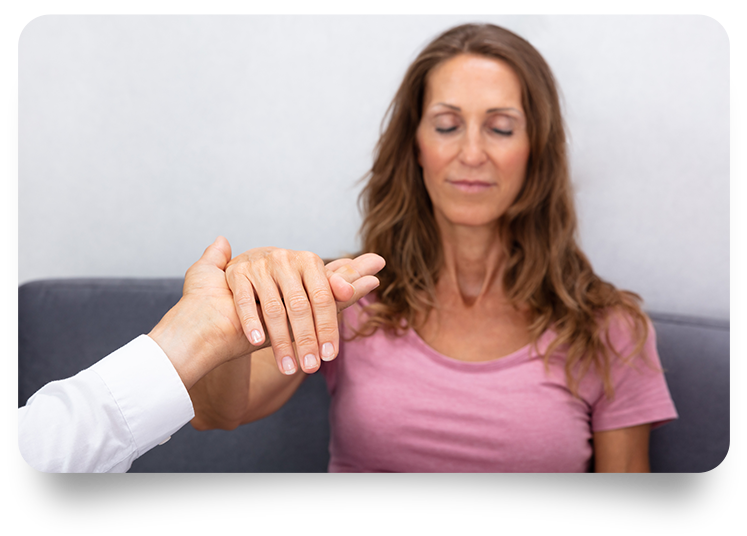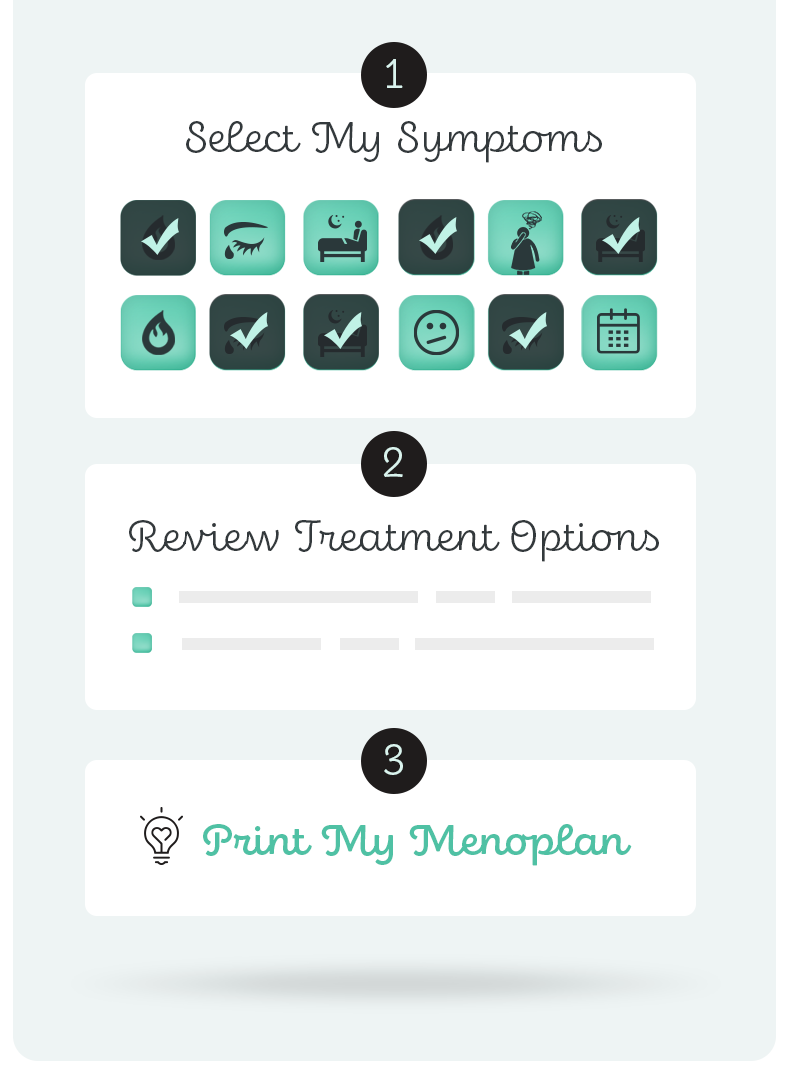Treatments
WHAT IS IT?
Hypnosis is a state where a person is relaxed, focused, and open to suggestion. Hypnosis can also be used for health.
Under hypnosis, a person concentrates on a thought or memory. Distractions are blocked out. The instructions used to put you under are called hypnotic induction. The number of sessions varies based on the problem. It is also possible to be trained in self-hypnosis for some problems, like hot flashes.
Some people are more easily hypnotized than others. People who are not “suggestible” do not benefit from hypnosis. You won’t know if it can work for you without a skilled therapist trying it.
OUR BOTTOM LINE: DOES IT HELP?
YES. Hypnosis can help some women with hot flashes, anxiety, depression, sleep, and menopause related quality of life, and possibly aches and pains. It is not risky, and it is safe for women with a history of breast cancer. You may have to try it to know if you are able to be hypnotized.

HOT FLASHES AND NIGHT SWEATS
Hypnosis can decrease the number of hot flashes and night sweats you have. Suggestions were for a hypnotic state, relaxation, mental imagery for coolness, and deepening hypnosis and dissociation from hot flashes. Hypnosis also decreases how severe hot flashes and night sweats feel. Suggestions may involve mental imagery for coolness, relaxing, and dissociation from hot flashes. Hypnosis decreases how much hot flashes and night sweats interfere with daily life.

SLEEP PROBLEMS & INSOMNIA
Hypnosis decreases sleep problems in women with hot flashes. It can help other types of people with sleep problems, too.

MOOD, ANXIETY & DEPRESSION
Hypnosis decreases both anxiety and depression in women with hot flashes. It is also effective in reducing anxiety and depression for people without hot flashes.

ACHES AND PAINS
Hypnosis can help with pain due to arthritis and surgery. It is likely that it could help with other chronic aches and pains. Sometimes hypnosis is used along with medications, enabling patients to use lower amounts of pain medications.

WEIGHT GAIN
Hypnosis helps with short-term weight loss. It can also help with long-term weight loss when combined with cognitive behavioral therapy. The studies, however, were not about menopause-related weight gain, so more research is needed.
POTENTIAL RISKS & SIDE EFFECTS
There are no risks. Side effects like dizziness or headaches are not common, but when they occur, do not last long.
IF I WANT TO TRY THIS TREATMENT WHAT ARE MY NEXT STEPS?
You can find certified clinical hypnotherapists through the National Board for Certified Clinical Hypnotherapists at: http://www.natboard.com/. Make sure the therapist has experience in dealing with your particular problems related to menopause.
There have been three studies of hypnosis and menopause symptoms, including one in breast cancer survivors. Women attended 5 weekly in-person sessions and practiced at-home self-hypnosis. There were structured and individualized hypnotic inductions. Hypnotic suggestions were targeted for particular symptoms.
Hypnosis may be an effective intervention to decrease hot flash frequency and severity among women with frequent VMS, including women with a history of breast cancer. The intervention may be most effective among women receptive to hypnosis (women randomized to the trial were interested in trying hypnosis).
Meta-analyses also show that hypnosis can be effective in reducing anxiety, depression, pain, and sleep problems among a variety of populations.
Barton DL, Schroeder KC, Banerjee T, Wolf S, Keith T, Elkins G. Efficacy of a biobehavioral intervention for hot flashes: a randomized controlled pilot study. Menopause 2017;24:774-782
Chamine I, Atchley R, Oken BS. Hypnosis Intervention Effects on Sleep Outcomes: A Systematic Review. Journal Of Clinical Sleep Medicine: JCSM: Official Publication Of The American Academy Of Sleep Medicine. 2018;14(2):271-283. doi:10.5664/jcsm.6952.
Cramer H, Lauche R, Paul A, Langhorst J, Kümmel S, Dobos GJ. Hypnosis in breast cancer care: a systematic review of randomized controlled trials. Integrative Cancer Therapies. 2015;14(1):5-15. doi:10.1177/1534735414550035.
Elkins G, Marcus J, Stearns V, et al. Randomized trial of a hypnosis intervention for treatment of hot flashes among breast cancer survivors. J Clin Oncol. 2008;26(31):5022-5026.
Elkins GR, Fisher WI, Johnson AK, Carpenter JS, Keith TZ. Clinical hypnosis in the treatment of postmenopausal hot flashes: a randomized controlled trial. 2013;20(3):291-298.
Leonard S. Milling, Keara E. Valentine, Hannah S. McCarley & Lindsey M. LoStimolo(2018)A Meta-Analysis of Hypnotic Interventions for Depression Symptoms: High Hopes for Hypnosis?,American Journal of Clinical Hypnosis,61:3,227-243,DOI: 1080/00029157.2018.1489777
Milling, L. S., Gover, M. C., & Moriarty, C. L. (2018). The effectiveness of hypnosis as an intervention for obesity: A meta-analytic review. Psychology of Consciousness: Theory, Research, and Practice, 5(1), 29–45. https://doi.org/10.1037/cns0000139
Ping-Ping Guo, Ping Li, Xue-Hui Zhang, Na Liu, Jie Wang, Dan-Dan Chen, Wei-Jia Sun, Wei Zhang. Complementary and alternative medicine for natural and treatment-induced vasomotor symptoms: An overview of systematic reviews and meta-analyses,Complementary Therapies in Clinical Practice, 36, 2019,181-194, ISSN 1744-3881, https://doi.org/10.1016/j.ctcp.2019.07.007.
Stefanopoulou E, Grunfeld EA. Mind-body interventions for vasomotor symptoms in healthy menopausal women and breast cancer survivors. A systematic review. Journal Of Psychosomatic Obstetrics And Gynaecology. 2017;38(3):210-225. doi:10.1080/0167482X.2016.1235147.
Thompson T, Terhune DB, Oram C, et al. The effectiveness of hypnosis for pain relief: A systematic review and meta-analysis of 85 controlled experimental trials. Neuroscience And Biobehavioral Reviews. 2019;99:298-310. doi:10.1016/j.neubiorev.2019.02.013.
Valentine, K. E., Milling, L. S., Clark, L. J., & Moriarty, C. L. (2019). The Efficacy of Hypnosis as a Treatment for Anxiety: A Meta-Analysis. The International Journal Of Clinical And Experimental Hypnosis, 67(3), 336–363. https://doi-org.ezproxy.lib.uconn.edu/10.1080/00207144.2019.1613863
Authors: Dr. Katherine Newton, & Dr. Leslie Snyder. Last reviewed April, 2021



